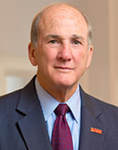
President Barchi presented his annual status report to the Rutgers community, focusing on student activism, academic success, record-breaking fundraising and campus improvements.
Barchi told the Senate that while a number of emotional and controversial issues have been discussed on campuses across the country, the Rutgers community has consistently provided examples of how such difficult topics and strongly held views can be openly and civilly debated.
Barchi also detailed how the Scarlet and Black report, written by the Committee on Disenfranchised and Enslaved Populations, confronted the founders’ participation in the slave trade, the debts to the many enslaved men and women consigned to build the university and the university’s role in displacing the Lenni Lenape.
“While our early history is disturbing, our response to our new knowledge has been inspiring,” Barchi said.
Looking back on Rutgers’ history, Barchi lauded the year-long 250th anniversary commemoration that included hundreds of activities — academic lectures, three 250th Anniversary Presidential Symposia on the Future of Higher Education, commemorative books, A Day of Revolutionary Thinking and, most importantly, President Barack Obama’s address to the graduating class of 2016.
Since its founding, Rutgers has granted more than 585,000 academic degrees, including those granted to the largest class in the university’s history in 2017.
This year, Rutgers received distinction by being listed among the top 25 public universities in the U.S. News and World Report and Wall Street Journal/Times Higher Education rankings.
Military Times also ranked the state univeristy No. 2 in the country among four-year colleges, while Rutgers University—Camden was named New Jersey’s first Purple Heart University for its services to veterans.
Student success and achievement is a top priority, Dr. Barchi said, which is why improving the student experience is so important.
Dr. Barchi highlighted prized fellowships and scholarships, as well as a Rutgers Business School team that recently won the global $1 million Hult Prize for social entrepreneurship.
“But our mission here isn’t just to train and to produce the winners of top scholarships and top competitions,” Barchi said. “It’s to train and produce the citizens of a civil democracy who are going to go out and take their places in leading this country after they leave us. That’s what I’m most interested in.”
Rutgers' reputation has grown, Dr. Barchi said, through its academic programs, alumni, administrative structure, athletic teams and star faculty.
This, he said, has led to a record-breaking year in fundraising, topping $200 million in private gifts for the first time in Rutgers history.
The university’s impact on New Jersey’s economic growth, highlighted in a report, Rutgers Grows the Garden State, is a testament to its statewide importance, he said.
The state’s third-largest non-government employer supports nearly 58,000 jobs statewide, generates $5.2 billion in annual economic activity in the state and returns nearly seven dollars to the New Jersey economy for every dollar that the state provides.
Economic growth can be seen in the capital projects completed and underway throughout the university, Barchi said.
From the time he joined Rutgers in the fall of 2012 to last summer, Barchi said Rutgers completed more than $1.8 billion in capital projects in New Brunswick, Newark and Camden. In the coming year, he said, several other major initiatives will continue, including:
- Designing and constructing facilities on each of our university campuses to provide one-stop services for students
- Renovating a historic building on Washington Street in Newark to serve as Rutgers University—Newark’s alumni center, and Van Nest Hall on the Old Queens campus in New Brunswick as the alumni house for Rutgers—New Brunswick
- Continuing our planning and design work for transforming the west end of College Avenue, creating a George Street transportation hub, and developing the Raritan waterfront
- Establishing a multi-town bike-share program in the New Brunswick area
“In the months ahead, we will have the opportunity to give our students a growing breadth of academic opportunities and an ever-higher level of service, to ensure that our faculty members have the best support for their research, to take New Jersey to a new level of quality in health care and to make our alumni proud,” Barchi said.
